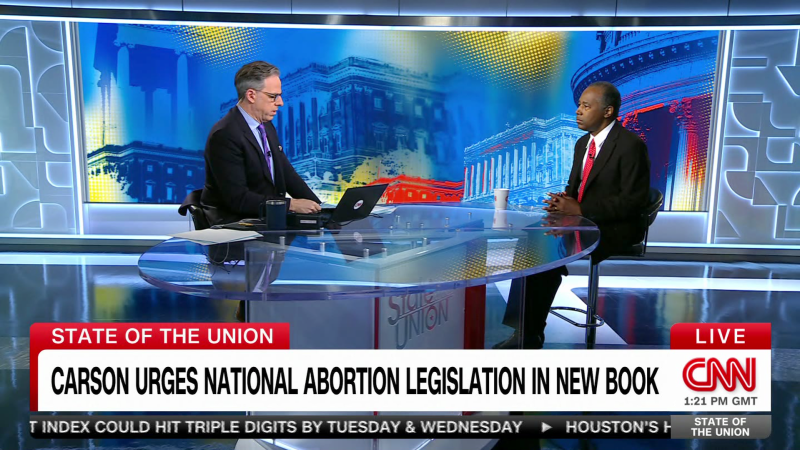Dr. Ben Carson, former HUD Secretary, expressed his agreement with President Trump’s stance on shifting the issue of abortion to the states during an interview with CNN’s Jake Tapper. Carson supported the idea of allowing discussions on abortion to take place between legislators and the people, indicating his belief in state autonomy when it comes to controversial issues like abortion. This position aligns with the conservative viewpoint of limited federal intervention in matters traditionally left to the states, such as healthcare policy. By emphasizing the importance of state-level decision-making on abortion, Carson is conveying his support for a decentralized approach that respects the diverse opinions and values of different regions within the United States.
Carson’s response to Tapper’s question reflects a broader trend within the Republican Party of prioritizing states’ rights and limiting federal oversight in social policy areas. This perspective is often associated with conservative politicians who advocate for a smaller role for the federal government in issues such as abortion, healthcare, and education. By supporting Trump’s position on abortion, Carson is aligning himself with a segment of the GOP that values individual states’ ability to make laws and regulations that reflect the preferences of their residents. This worldview emphasizes local control and autonomy, as opposed to centralized decision-making by the federal government, on matters that are considered morally and ethically sensitive by many Americans.
The debate over abortion rights has long been a divisive issue in American politics, with supporters and opponents of abortion rights holding strong and often conflicting beliefs. By endorsing Trump’s approach of deferring to states on matters of abortion, Carson is entering a contentious and emotionally charged political discussion that has far-reaching implications for women’s reproductive rights. The decision to shift the responsibility for regulating abortion to individual states has the potential to create a patchwork of laws and regulations across the country, leading to disparities in access to reproductive healthcare and potentially infringing upon women’s constitutional rights. Carson’s support for this approach signals his alignment with the anti-abortion movement and his prioritization of restricting access to abortion services through state-level legislation.
Carson’s assertion that discussions on abortion should be conducted between legislators and the people implies a belief in the democratic process and the importance of public input in shaping policy decisions. By advocating for a state-based approach to abortion regulation, Carson is endorsing a system that allows for local communities and elected officials to determine the parameters of abortion access and restrictions within their jurisdictions. This decentralized approach to governance reflects Carson’s broader philosophy of limited government intervention and emphasizes the role of individual states in tailoring policies to suit the needs and values of their populations. While this approach may appeal to conservative voters who value states’ rights and local autonomy, it also raises concerns about potential inequalities in access to healthcare services and the erosion of reproductive rights protections for women.
In aligning himself with President Trump’s stance on abortion, Carson is signaling his support for a conservative agenda that places greater emphasis on states’ rights and limited federal intervention in social policy issues. This approach reflects a fundamental disagreement with the role of the federal government in regulating controversial topics such as abortion and signals a preference for a more decentralized decision-making process that empowers individual states to set their own policies. Carson’s endorsement of Trump’s position underscores his alignment with the Republican Party’s broader platform on social issues and his commitment to advancing conservative principles through legislative and policy initiatives. As a key figure in the conservative movement, Carson’s support for state-level regulation of abortion carries significant weight and may influence the direction of future policy debates and legislative efforts in this area.
Overall, Dr. Ben Carson’s agreement with President Trump’s stance on shifting the issue of abortion to the states reflects a broader conservative perspective on federalism, states’ rights, and limited government intervention in social policy areas. By emphasizing the importance of local decision-making on abortion regulations, Carson is supporting a decentralized approach that values the input of legislators and constituents at the state level. While this position aligns with traditional conservative values and the GOP platform, it also raises concerns about potential disparities in access to reproductive healthcare services and the erosion of women’s constitutional rights. Carson’s endorsement of Trump’s approach to abortion regulation signals his alignment with the anti-abortion movement and his belief in restricting access to abortion services through state-level legislation. Ultimately, Carson’s comments highlight the ongoing debate over abortion rights in American politics and the complex interplay between federal and state authorities in shaping policy decisions on this contentious issue.


